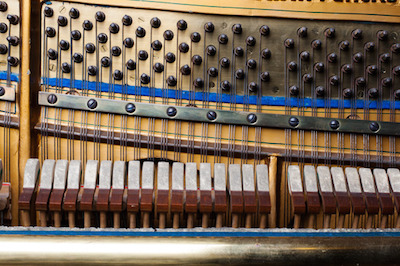Whether you are brand new to playing the piano, or have been playing for years, there is an advantage to understand the fundamentals of how your piano was constructed and the best way to maintain it for optimal results. The more you know, the more you will understand what is truly possible for the way your piano is constructed. It will help you understand when a problem occurs. And it will also help you make wise decisions about tunings, maintenance, repair and restoration.
To start, it’s important to speak the same language as any technician who may have access to your piano down the road. For example, piano technicians use a simple numbering system when referring to the keys. The lowest key on a piano is the A in the bass. This key is labeled number 1. From there, each key is numbered in succession until you reach the highest key in the treble, number 88. These keys not only identify the keys themselves, but also the action and parts used to create sound. If you have a problem with a range, you can easily identify it by number when talking with a technician, and he will immediately understand.
Piano Tuning
Tuning is the very basic of maintenance required to keep a piano fully functioning. Regular tuning not only keeps a piano up to pitch, but also prevents damage to the instrument. All pianos today are designed to be tuned at A-440. This means the A just above the middle C (number 49) should vibrate at 440 cycles per second. Each of the other keys will then fall into order. Piano strings are under heavy tension, at about 160 pounds per string. If the piano is left untuned, the pitch will gradually drop as the strings loosen. As this happens, key number 49 will no longer play at 440, but will drop rapidly from there. Tuning will prevent this drop from occurring. It will bring not only key 49 back to proper cycle, but the rest of the keys as well.
Piano Cleaning
Just like every piece of furniture in your home, in order to stay in good condition, a piano should be cleaned on a regular basis. While there are some things you can do – keep dust from accumulating on the keyboard and the cabinet – there are other things a technician will do. When your piano is in tune, he will clean the soundboard with a soft cloth. The strings and tuning pins collect dust over time, and it’s important to remove this on a periodic basis. The felt under the keys should also be cleaned periodically. The keys on an upright can be removed without disturbing the action. On a grand, it is necessary to remove the entire playing mechanism for cleaning. This can help keep the keys perform more evenly, and can help with regulation.
Piano Regulation
The proper regulation of the piano action is essential to controlling the keys. It affects both the keyboard and the speed with which a note can be repeated. When the keys are regulated, they should be perfectly even. This is most easily seen with the white keys, where all are perfectly aligned. A well regulated keyboard is slanted slightly away from the performer when the keys are at rest. When they are depressed, the should slant slightly towards the performer. This action should occur with every movement made, while at no time allowing a pianists fingers to touch the white keys when the black keys are depressed.
Piano Voicing
For a piano to have good tone, it must have a well regulated action, perfect tuning, and hammers that are properly shaped and voiced. The hammers become grooved with use. As the groves deepen and continue to form, the tone of the piano is impacted. Hammers are voiced by softening or hardening the felt in order to bring back a particular tonal quality. Voicing should leave the felt of all hammers with a certain level of consistency. Tuning and voicing often go hand in hand in making a piano sound its best. The two processes are interdependent. Voicing cannot be done successfully unless the piano is in tune, but even a perfectly tuned piano won’t sound its best if it is not properly voiced. The key to great piano service is to have a technician well versed in both.
Have any additional questions about piano maintenance? Give us a call today.

